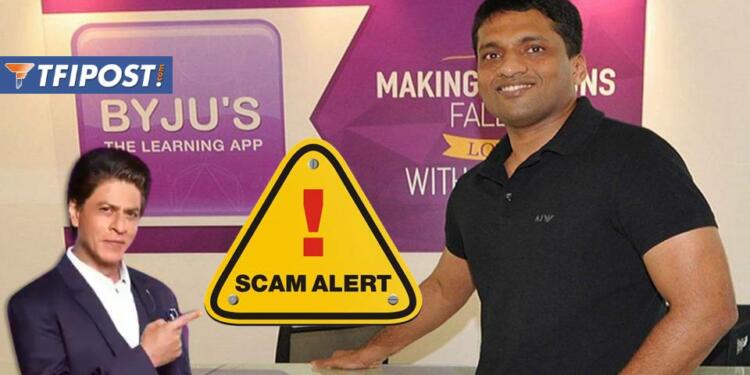One skill that is fundamental to any business is grabbing people’s needs or interests and further using them to turn in profits for the enterprise. This process became preliminary for almost every business emerging in the modern-day era of digitization. Numerous sectors experienced a boom by shifting online, but the education sector stands highest among them. However, some of the giants in this sector are running a scam in order to lure more and more investors. BYJU’s seems to be functioning on the same lines.
BYJU’s under suspicion
Recently, BYJU’s announced a funding round worth Rs. 1200 crore from a foreign-based company. However, the company is yet to receive these funds. In September 2021, US-based Oxshott invested Rs 1,200 crore in BYJU’s as part of a Series F round, at Rs 285,072 per share. According to The Morning Context, other investors in the round included Edelweiss (Rs 344.9 crore), IIFL (Rs 110 crore), Verition Multi-Strategy Master Fund (Rs 147 crore), and XN Exponent Holdings (Rs 150 crore).
This came into the limelight after a report which claimed that some money in the Rs 6,300 crore private equity investment, which BYJU’s company announced early this year, has not yet come to the ed-tech company. On the other hand, BYJU’s stated that the company has received some of the funds while the rest of them are being tracked.
In March, BYJU’S announced raising about Rs 6,300 crore from Sumeru Ventures, Vitruvian Partners, and BlackRock. Byju Raveendran, the Founder, and CEO of the company was also part of the funding round and made a personal investment of $400 million.
This paves the way for suspicion of the company’s attempts to lure more and more investors. BYJU’s is an ed-tech giant which is relentlessly expanding itself, without even a necessary need to welcome such huge chunks of investment.
Read more: BYJU’s on the road to become the next SAHARA….
The beginning
Around 2003, Byju Raveendran decided to help some of his friends appearing for CAT exams. He too attempted the competitive exam and scored 100 percentile twice. However, he chose his job over India’s top business schools. He later had an idea to start teaching students.
Byju started by teaching very few students but he later turned his teaching skill into a leading business enterprise. The ed-tech giant BYJU’s was initially developed by Think and Learn Pvt. Ltd, a company that was established by Byju Raveendran, Divya Gokulnath, and a group of students in 2011. In the initial days, the company was started with a focus on offering online video-based learning programs for the K-12 standard of students and other competitive exams as well. In August 2015, the firm launched “BYJU’s: The Learning App”. Soon, with its growing popularity, the company formed a family of 15 million users, out of which around 9,00,000 were paid users by 2018.
The rapid burgeoning popularity of BYJU’s has never been a secret. Even today, its prevalence can be found in almost every nook and corner of the world. With this pervasiveness, various foreign investors were getting inclined toward the high-rated popularity of the company. It is pertinent to note here that BYJU’s: The Learning App, accomplished a net revenue worth Rs. 28 billion in the year 2020 alone.
The achieved revenue of the company was apparently possible with BYJU’s technique of instant action. The company was allured with the profiting figures, and thus it became desperate to welcome more and more investment and construct a complete empire as a leading ed-tech giant.
Leading acquisitions by the ed-tech jumbo
With the burgeoning profits and investment, BYJU’s has gone on an acquisition spree in India and globally. As per Business Standard, the start-up has now acquired about 9 companies in India and the US this year, and spent more than $2 billion in the past several months on these acquisitions.
In April, the giant bought the New Delhi-based Aakash Educational Services (AESL) for $950 billion. In addition to the purchase of Singapore-headquartered Great Learning, a leading global player in professional and higher education for $600 million.
In July, BYJU’s acquired a US-based digital reading platform, Epic for $500 million. In 2019, BYJU’s bought educational gaming company, Osmo for $120 million in a stock-and-cash deal. In August 2020, BYJU’s also bought WhiteHat Jr, which teaches coding to children, for $300 million.
Read more: From Unacademy to BYJU’s, the unbelievable rise of Indian EdTech start-ups in less than a decade
Expanding resulted in the decline of the company
In the wake of grabbing huge investments, the company treasury soon started drying up in buyouts and the shift of business to offline mode limited the sources of revenue. The expectation of business to shift the whole education system into virtual mode had a break and huge buyouts started to pose financial constraints to the company.
It is pertinent to note that due to these looming financial difficulties, BYJU’s subsidiaries Toppr and WhiteHat Jr. have lain off at least 600 jobs combined. Apart from this, last year BYJU’s acquired at least 10 ed-tech startups and the total transaction value of them is estimated to be $2.5 billion. But the reopening of schools, colleges, and coaching centres has pushed the company into a dilapidated state.
Apparent scamster: BYJU’s
Though BYJU’s is a gigantic entity, its quality of education that is supposedly teaching the future generation, doesn’t match the size of the enterprise. Their strategy to market their product often causes a burden on the parents to buy their package, as they create circumstances of threat. They deliberately hover a sword of children’s off-track careers over their necks if parents don’t purchase their services.
It is a tactic of the ed-tech company that they ask children difficult questions which ultimately leads to the inability of the students in answering them. One of the customer’s experiences clarifies the company’s forceful attempt over the parents. In various cases, it was also found out that the customer’s didn’t get the services as promised. Further, the company even stopped answering the calls from their customers.
Apart from this, BYJU’s is apparently the most visible brand on Indian TV, with various Bollywood superstars driving its flashy ad campaign as brand ambassadors. The ed-tech companies are very well aware that the amount of attraction that children possess with Bollywood celebrities is huge. And this forces the parents more to buy the company’s services.
Various parents claim the tactics included rigorous cold calls and sales pitches, which carries a focused effect to convince them that their child, will be left behind if they don’t buy a BYJU’s product. Not only this, BYJU’s also started courses at low costs for parents who are not able to afford the services. The company often pushed its product irrespective of whether the child needed it or the family could afford it.
Several employees also pointed out that they were often pushed to meet unrealistic targets. It was reported that the managers humiliate sales people for not meeting their targets. Various Employees have even faced a round of layoffs in the company due to the entity’s financial crisis.
The outspoken scam that BYJU’s is running also roots in their system of anonymous prices for their packages. It’s a marketing technique that the company uses to fill its pockets. The online education platform charge hordes of money from people, resulting in forceful condition of “do or die” (either purchase the services or sacrifice the career of your kid). This shows the scam being regulated by BYJU’s.
Support TFI:
Support us to strengthen the ‘Right’ ideology of cultural nationalism by purchasing the best quality garments from TFI-STORE.COM






















